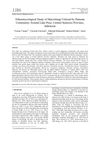 8 citations,
January 2021 in “Smart materials in medicine”
8 citations,
January 2021 in “Smart materials in medicine” The new hydrogel is good for wound dressing because it absorbs water quickly, has high porosity, can release drugs, fights bacteria, and helps wounds heal with less scarring.
[object Object]  6 citations,
August 2017 in “Physiological Research”
6 citations,
August 2017 in “Physiological Research” Setipiprant may reduce inflammation by blocking an enzyme called aldose reductase.
 5 citations,
September 2019 in “ACS Applied Bio Materials”
5 citations,
September 2019 in “ACS Applied Bio Materials” The hydrogel with bioactive factors improves skin healing and regeneration.
 5 citations,
November 1999 in “Medical Hypotheses”
5 citations,
November 1999 in “Medical Hypotheses” Minoxidil, a common hair loss treatment, might work by counteracting a hormone that reduces hair growth and promotes hair loss.
 4 citations,
January 2012 in “Elsevier eBooks”
4 citations,
January 2012 in “Elsevier eBooks” The document concludes that various skin conditions have specific treatments, ranging from antihistamines for urticaria to surgery and medication for tumors and chronic skin diseases.
 2 citations,
October 2015 in “Human Gene Therapy”
2 citations,
October 2015 in “Human Gene Therapy” The congress highlighted new gene therapy techniques and cell transplantation methods for treating diseases.
 1 citations,
January 2019 in “Elsevier eBooks”
1 citations,
January 2019 in “Elsevier eBooks” New scaffold materials help heal severe skin wounds and improve skin regeneration.
 1 citations,
June 2018 in “Advances in Cosmetic Surgery”
1 citations,
June 2018 in “Advances in Cosmetic Surgery” PRP might help with hair growth and skin rejuvenation, but more research is needed to prove its effectiveness.
 1 citations,
July 2005 in “Informa Healthcare eBooks”
1 citations,
July 2005 in “Informa Healthcare eBooks” Hair follicles could be used for targeted drug delivery, with liposomal systems showing promise for this method.
 March 2024 in “Jordan Journal of Biological Sciences”
March 2024 in “Jordan Journal of Biological Sciences” The Pamona community uses 21 types of mushrooms for food, medicine, and other needs, highlighting the importance of conserving these resources.
 April 2021 in “Journal of Investigative Dermatology”
April 2021 in “Journal of Investigative Dermatology” The research found genes that may protect certain scalp cells from hair loss.
 January 2020 in “Elsevier eBooks”
January 2020 in “Elsevier eBooks” Plant-based chemicals may help hair growth and prevent hair loss but need more research to compete with current treatments.
 April 2017 in “Journal of Investigative Dermatology”
April 2017 in “Journal of Investigative Dermatology” The document concludes that various topical treatments show promise for skin conditions like atopic dermatitis, psoriasis, and hair loss.
 December 2011 in “The Egyptian Journal of Histology”
December 2011 in “The Egyptian Journal of Histology” High-fructose diets can cause irreversible kidney damage.
 January 2011 in “Elsevier eBooks”
January 2011 in “Elsevier eBooks” Alopecia in animals can be hereditary, congenital, or acquired, with treatments and outcomes varying widely.
 January 1997 in “Elsevier eBooks”
January 1997 in “Elsevier eBooks” The document explains how shampoos clean, rinses condition, one-step shampoos offer convenience, and hair growth promoters aim to prevent hair loss, emphasizing the importance of scientific evidence for their effectiveness.
 August 1978 in “Dicp-The annals of pharmacotherapy”
August 1978 in “Dicp-The annals of pharmacotherapy” Mannitol diuresis allows higher doses of cis-platinum for testicular cancer treatment without increasing kidney damage.
[object Object]  140 citations,
December 2017 in “Journal of Controlled Release”
140 citations,
December 2017 in “Journal of Controlled Release” Microneedles improve drug delivery in various body parts, are safe and painless, and show promise in cosmetology, vaccination, insulin delivery, and other medical applications.
 88 citations,
January 2019 in “Journal of Tissue Engineering and Regenerative Medicine”
88 citations,
January 2019 in “Journal of Tissue Engineering and Regenerative Medicine” Conditioned media from mesenchymal stem cell cultures could be a more effective alternative for regenerative therapies, but more research is needed.
 80 citations,
April 2017 in “Frontiers in Pharmacology”
80 citations,
April 2017 in “Frontiers in Pharmacology” PDRN helps repair tissue and improve wound healing with a high safety profile.
 61 citations,
November 2020 in “Molecules”
61 citations,
November 2020 in “Molecules” Conductive hydrogels show promise for medical uses like healing wounds and tissue regeneration but need improvements in safety and stability.
 26 citations,
May 2021 in “International Journal of Molecular Sciences”
26 citations,
May 2021 in “International Journal of Molecular Sciences” Cheonggukjang may help prevent and manage various diseases and improve overall health, but its odor and safety concerns need addressing.
 8 citations,
March 2018 in “Expert Review of Respiratory Medicine”
8 citations,
March 2018 in “Expert Review of Respiratory Medicine” Inhalation therapy may repair and protect elastin in the lungs of COPD patients.
 6 citations,
June 2019 in “Biotechnology Letters”
6 citations,
June 2019 in “Biotechnology Letters” Gene therapy shows promise for improving wound healing, but more research is needed for human use.
 3 citations,
October 2022 in “PloS one”
3 citations,
October 2022 in “PloS one” Scientists have developed a method to keep chicken feather follicles alive and structurally intact in a lab for up to a week.
 November 2021 in “Austin therapeutics”
November 2021 in “Austin therapeutics” Current treatments for hair loss from chemotherapy are limited, but new methods are being researched.
 6 citations,
May 2022 in “Colloids and Surfaces B: Biointerfaces”
6 citations,
May 2022 in “Colloids and Surfaces B: Biointerfaces” Eating peptides from certain shellfish may help wounds heal faster by reducing inflammation.
 May 2023 in “Research Square (Research Square)”
May 2023 in “Research Square (Research Square)” Blocking the HEDGEHOG-GLI1 pathway can reduce keloid growth and may be a potential treatment.
20 citations,
July 2019 in “Stem cell investigation” Combining SVF and PRP speeds up wound healing.
20 citations,
June 2014 in “Pharmaceutical research” Using both hyaluronic acid compounds together improves skin hydration and reduces wrinkles better than using one alone.



























